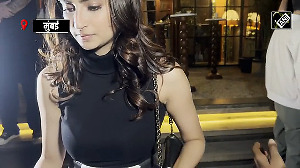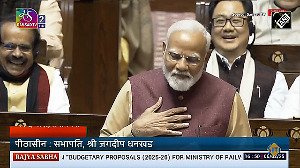

Working actively at 78 isn't something most people can manage. Then again, Dr V Shanta isn't like most people. A doctor by profession, her day starts at 5.45 am and ends an hour before midnight. As she stays on the first floor of her hospital, a typical day starts with her coming down at 7.15 if it's her turn to do the rounds, 8.15 if it's her day at the operating theatre, and 9 if it's her day for meeting with patients.
On theatre days, she begins operating at 8.30 am sharp. In her younger days, the operations would go till 4 or 4.30 in the evening. Now, they rarely go beyond 2.30 pm. "I can't stand for very long as my legs start to ache," she says. "As doctors, we would like to continue doing what we have, unless we are incapacitated. Fortunately, I am not. Yes, people find it surprising, but I don't find surgery difficult to manage even though I'm 78."
Until a couple of years ago, Dr Shanta used to do all gynaecological and breast surgeries. Now, she does fewer gynaecological surgeries, as they are taxing, but agrees if some patients insist on her doing them.
A typical day of rounds begins with a staff board meeting. She then gets down to the rounds, which are done by half past one. After a quick lunch, she is back at the office, meeting people and staff, taking care of administrative work, concentrating on public relations to raise funds for treating the poor. Treatment for 60 per cent of patients at her hospital is free. By 7, she's back in her room, writing medical papers for publication, preparing for guest lectures or reading up on developments in medicine. The only relaxation for her, before bed at 11, is listening to Carnatic music or reading Readers' Digest.
For Dr Shanta, the hospital is her home. It is her temple, a place where she has spent all her life. It comes as a surprise to few, then, that she is this year's Magsaysay award winner. The home and temple she refers to is the Adyar Cancer Institute, a place that gives hope and succour to thousands of poor cancer patients from across India.
Nobel Laureates in the family
As a child, Shanta had just one dream -- to become a doctor. Unlike most women of the time who were housewives, or worked as teachers or nurses, she wanted to be a 'hi-tech professional'. "I wanted to be unique, do something different and totally independent," she says. She didn't have a role model, but the people who inspired her were her maternal uncle, Nobel Laureate Dr Subrahmanyam Chandrasekhar and her grandfather's brother, Sir C V Raman, another Nobel Laureate. "We looked up to them, and I wanted to achieve at least a small portion of what they had."
She has managed well. The Magsaysay Award has long been considered the Nobel Prize of Asia.
The Adyar Cancer Institute
When Dr Muthulakshmy Reddy, India's first woman medical graduate and a social reformer, started the Adyar Cancer Institute in Chennai in 1954, it was the only cancer hospital in south India. Established with public donations as a voluntary, charitable and non-profit institution, it started with a single building. There were minimal diagnostic and therapeutic facilities, with a cluster of 12 huts to house patients. It also had just two doctors -- Dr Krishnamurthy (who was Dr Muthulakshmy Reddy's son) and Dr Shanta.
In hindsight, it appears Dr Shanta was destined to be a cancer specialist. "My first posting as a house surgeon was in the cancer unit. That is where I met Dr Krishnamurthy, who had come back to India after training for the treatment of cancer so that he could treat India's poor."
Fiftyone years later, Dr Shanta says she has more unhappy memories than happy ones. The journey has been one of "obstacles, blood, tears, pain and stones." When asked to elaborate, she mentions government servants. "They can be very, very difficult and they never look at you as equals," she says. "They love to create some problem or the other before they give you something. It used to be very bad earlier. Gradually, things became better, not because of any easy dealing with the government but because we have learnt the need to be independent."
Being independent, however, means having to raise funds constantly, for anti-cancer drugs, food, equipment and research.
 Dr Shanta is of the opinion that the most difficult thing to get these days is equipment, because of the high costs involved. There was a time when the hospital would get a lot of equipment through international aid but, of late, this has been hard to come by as India is looked upon as a developing country. "I think it is a euphemism to call India a developing country, because medical technology equipment has not gained any momentum here. We may be very good with electronics, communication and defence, but not medical technology. We need more international aid and support, as well as inter-governmental aid."
Dr Shanta is of the opinion that the most difficult thing to get these days is equipment, because of the high costs involved. There was a time when the hospital would get a lot of equipment through international aid but, of late, this has been hard to come by as India is looked upon as a developing country. "I think it is a euphemism to call India a developing country, because medical technology equipment has not gained any momentum here. We may be very good with electronics, communication and defence, but not medical technology. We need more international aid and support, as well as inter-governmental aid."
Research is another area every hospital must stress upon, she says, but the Adyar Cancer Institute is struggling to continue because this requires huge funding. "We also need dedicated people to do research, and they are hard to get. Everybody is in the era of corporate ethos."
The Magsaysay Award
It was an unexpected, pleasant surprise for the doctor when the president of the Ramon Magsaysay Award Committee called her from the Philippines to inform her of the award. The president said, "We have just finished the meeting and you have been chosen." Dr Shanta had no words to express her feelings. She just said, "I am honoured and privileged." She still has no idea who suggested her name to the committee. The staff at the hospital are exhilarated; they look at the award as their own, which makes Dr Shanta even more proud and happy. "The award is theirs too, as we are one family."
Her Dream
Dr Shanta's dream for the hospital is that the next generation to take over the hospital shouldn't face the obstacles and frustrations she and the seniors did. "Everything they want must be available to them. Which is why I want to build a foundation on which they can continue to work without difficulty. They are willing to work, if provided with facilities." Her second dream is to popularise early cancer detection programs; her third, to enhance the hospital's research capabilities.
The journey continues
Though the road has been full of blood and tears, what motivated her all these years was what she imbibed as a young person from the Bhagavat Gita and the writings of Swami Vivekananda, that action is duty and fruit is not the concern.
"If we have grown, it is because of the grace of God, and our faith in our mission," she says. "The journey has been long. I don't see an end to it, simply because our work is never ending. What we have done is very little. There is much more to do. The journey has been arduous, with bricks and stones and occasional flowers strewn in between, but we continue "
Photographs: Sreeram Selvaraj






 © 2025
© 2025